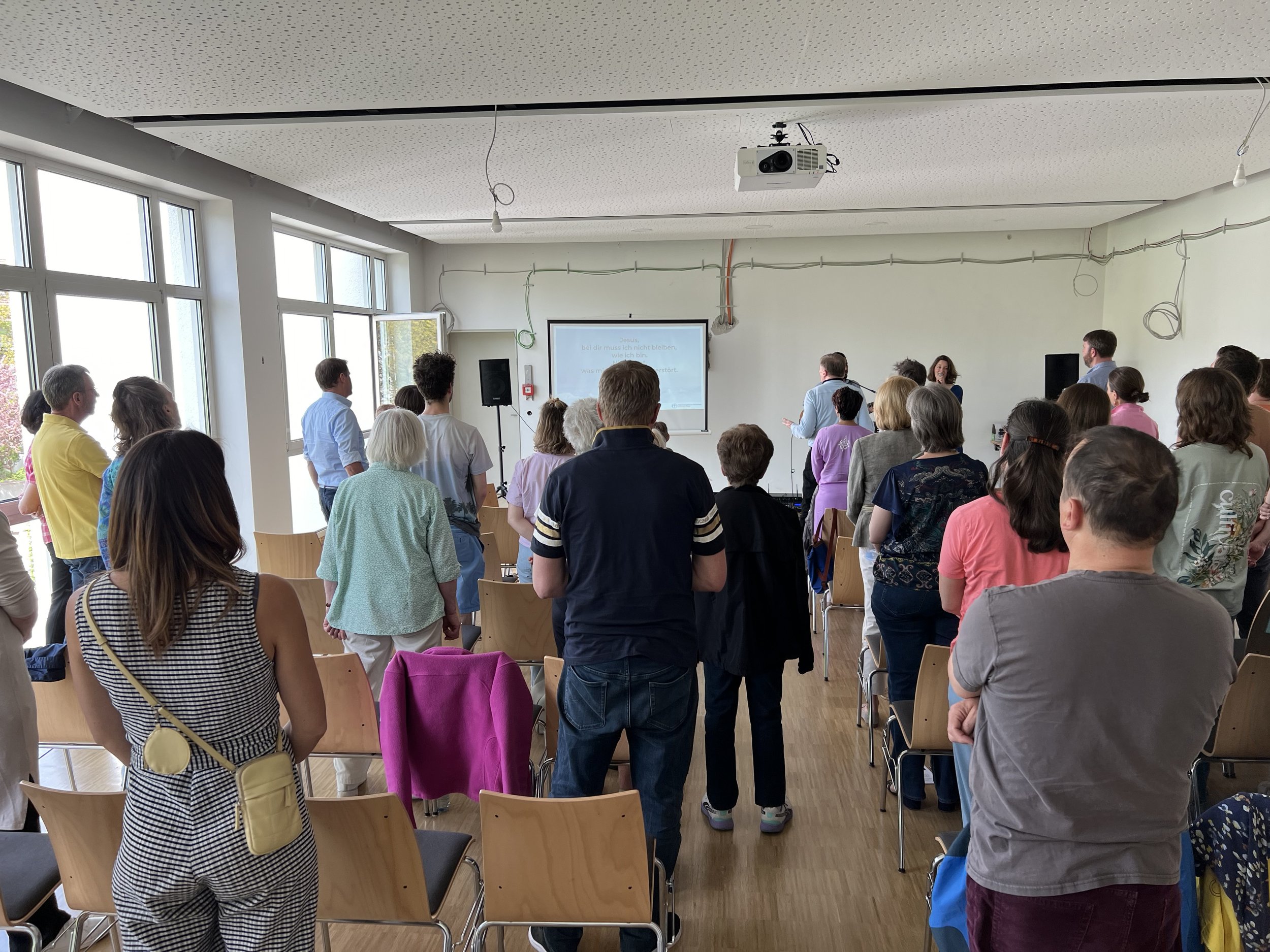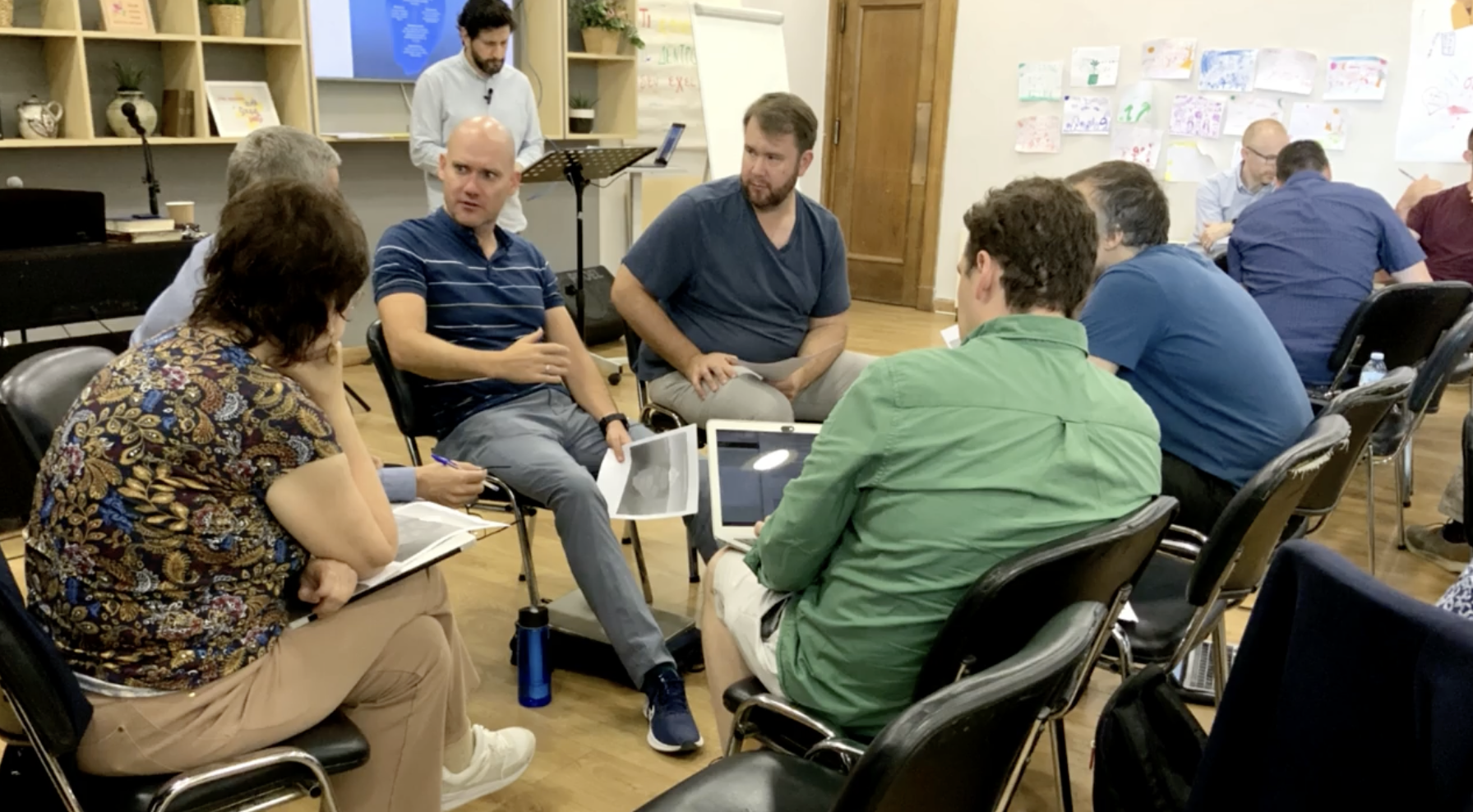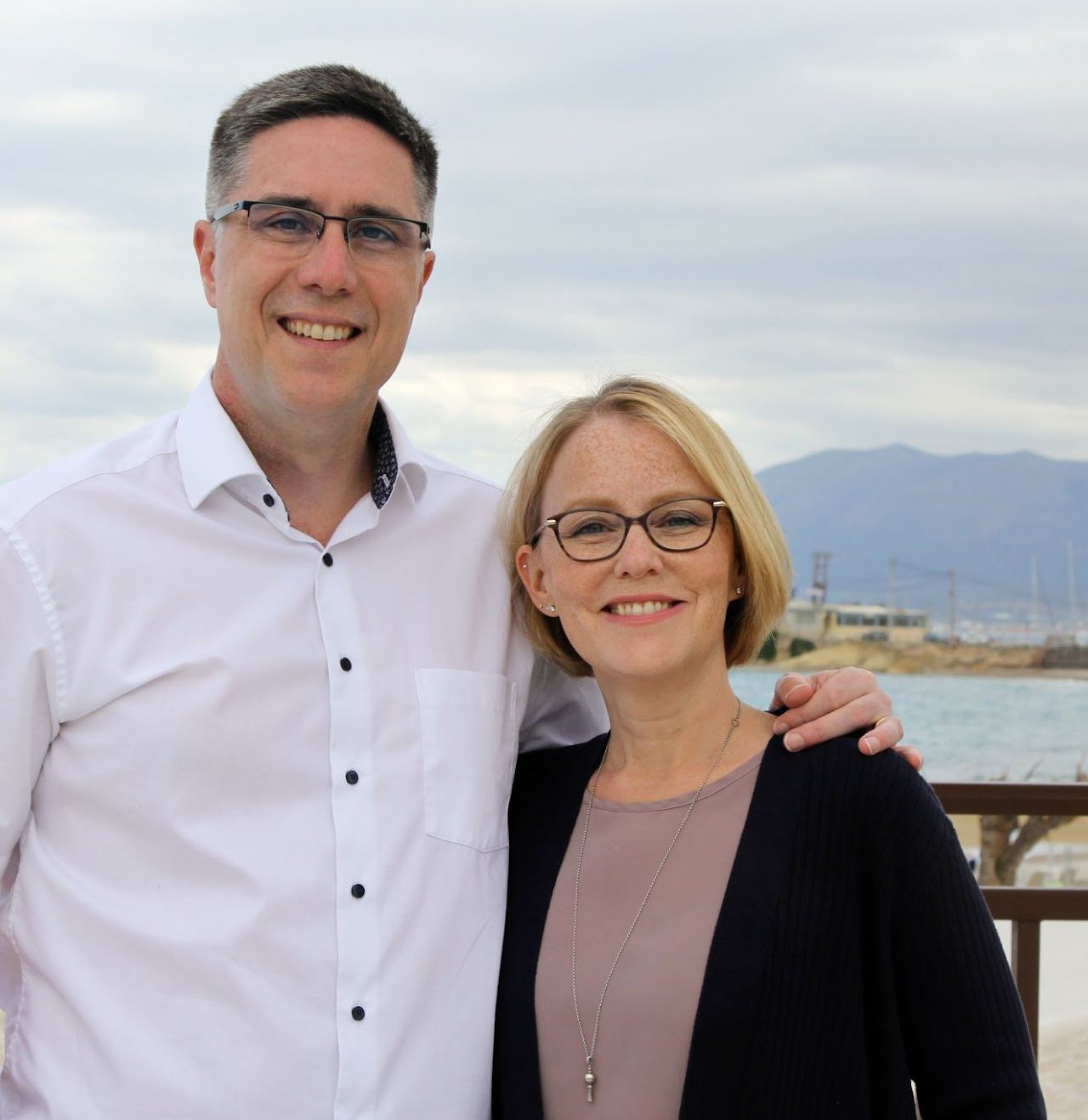
from October 2023 to June 2024
Church Planting
Training Cohort
SCROLL TO SEE MORE
This cohort is designed to equip teams to plant reformed, covenantal churches. This course is not just to equip primary or facilitative church planters, but also all other teammates involved in a church-plant so everyone understands how to contribute to a healthy church plant.
LET US KNOW IF YOU WOULD LIKE TO JOIN!
Key Questions
How do you keep the Gospel at the center of a church-plant?What are the characteristics of effective church-planters and church-planting teams?How do you see your culture in light of our doctrine?How do we engage culture? How do we contextualize appropriately?How do you develop leaders?What factors are important for a church-planting movement?
Goals
To understand the biblical foundations of church-plantingTo wrestle with the typical challenges every church plant facesTo establish a church-planting method which can be contextualizedTo inspire and motivate participants toward church-plantingTo interact with helpful literature on church-plantingTo be able to clearly present your church-plant’s strategic plan
Outcomes
A clearly formulated philosophy of ministryA concrete strategic plan
Training Schedule
Intensive in Athens, Greece
First Greek Evangelical Church
Leof. Vasilisis Amalias 50, Athina 105 58, Greece
October 10-12
Gospel Spirituality and Gospel Centrality (Giotis Kantarkzis)Character and Compentencies of a Church-Planting Team (David Stoddard)Theological Vision (Sashko Nezamutdinov)Cultural Engagement (Tim Coomar)Researching Your Community (Alexandros Pipilios)Gospel Contextualization (Sashko Nezamutdinov)Trainers: Sashko Nezamutdinov, Giotis Kantarkzis, Tim Coomar, Alexandros Pipilios, David StoddardTackling Social Justice Issues
David Robertson
09:00-11:00 CET (Berlin)
November 2
-
The Western world in which we live has a profoundly disturbing dynamic to it. Things once regarded as obvious and everlasting virtues have recently been subject to criticism and ridicule. So many areas of our lives and world seem to be in flux that there seems very little that is solid or constant by which we can navigate the apparent chaos around us. How should we as church-planters respond to these difficult changes and stay on top of constant changes?
Recommended Reading:
The Rise and Triumph of the Modern Self, Carl Trueman
Strange New World, Carl Trueman
Telling a Better Story, Joshua D. Chatraw
The Beauty of the Binary, Luke Griffo
What God Has to Say about Our Bodies, Sam Allberry
Evangelistic Worship
December 7
Sashko Nezamutdinov
14:00-16:00 CET (Berlin)
-
In Acts 2 worship happens by miraculous divine intervention. In 1 Corinthians 14 it happens by human design and effort. But it cannot be missed that Paul directly tells a local congregation to adapt its worship because of the presence of unbelievers. It is a false dichotomy to insist that if we are seeking to please God we must not ask what the unchurched feel or think about our worship. Our purpose is not to make unbelievers comfortable. Our aim is to be intelligible to them. We must address their heart secrets (1 Cor. 14:25). That means we must remember what it is like to not believe.
Recommended Reading:
Christ-Centered Worship, Bryan Chapell
Evangelistic Worship, Timothy Keller, white paper
Theology of Faith & Work
January 18
George Tolias
14:00-16:00 CET (Berlin)
-
Most Christians spend their working lives hoping that God will find some way to use their efforts for his priorities. They may not be able to see how God can use what they consider their daily grind or, by contrast, the glorious pursuits for which they are passionate. Still, because they are God’s people, they pray that he will provide some real connection between their work and his mission for our world. As church-planters, these are some of the questions we have to answer to the people we are trying to reach and engage in ministry: What is the purpose of work? How can I use my skills in a vocation that has meaning and purpose? Can I stay true to my values and still advance in my field? When we realize that every honest job exists on the holy ground of God’s calling, then we will rejoice in the mission we have at work.
Suggested Reading:
Every Good Endeavour, Timothy Keller
Grace at Work, Bryan Chapell
Difficult Conversations
February 8
Cartee Bales
14:00-16:00 CET (Berlin)
-
Conflict will be inevitable on any staff, regardless of team culture or experience of the members. The key for leaders is to learn how to handle this conflict when it arises while still leading the team well. The Bible gives us many examples of conflict resolution that church-planters can implement next time they find themselves dealing with staff conflict.
Recommended Reading:
Difficult Conversations: How to Discuss What Matters Most, Douglas Stone
Peace Pursuit Handbook, John Shindeldecker
Intensive in Edinburgh, Scotland
Edinburgh Theological Seminary
15 N Bank St, Edinburgh EH1 2LS, United Kingdom
March 19-21
Public Faith (Sashko Nezamutdinov)Strategy-making: Using Wisdom in Your Cultural Context (Mike Tilley)Gospel Preaching (Neil MacMillan)Launching Your Church (David Stoddard)Gospel-based Discipleship (Neil MacMillan)Ministry Balance (David Meredith)Speakers: Mike Tilley, Neil MacMillan, Sasko Nezamutdinov, David Stoddard, David MeredithCultural Apologetics & Evangelism
April 11
Tim Coomar
14:00-16:00 CET (Berlin)
-
How do we best connect to unbelievers and connect them to Christ? It begins by understanding how to recognize the cultural glasses we wear, removing them, and exchanging them for other lenses. We need to learn to see life through others' lenses, but ultimately help them see life through the lense of the Gospel. The first "seeing" involves critical engagement, the second Gospel proclamation. This will be a workshop unpacking Dan Strange's model of "subversive fullment."
Recommended Reading:
Plugged In & Making Faith Magnetic, Dan Strange
Developing Leaders
May 16
David Stoddard
14:00-16:00 CET (Berlin)
-
There are plenty conferences, books and trainings on leadership, about having plurality of elders to protect the church, but not much training out there that talks about the culture of the eldership, diaconate, or leadership team. Church-planting usually involves teams of people. Leadership teams are important. We do need to have a planter directing the vision and leading the church, but a strong team is needed to establish healthy churches, which includes holding leaders accountable in meaningful ways. In this seminar we will look at the Lead Develop Care model as it applies to church-planting and developing leaders around you.
Recommended Reading:
Lead, Paul David Tripp
Lead, Develop, Care, by Terry Cook
Final Matters & Closing
June 6
David Stoddard & Sashko Nezamutdinov
14:00-16:00 CET (Berlin)

October Intensive Info
Athens, Greece
WHEN
OCT 10-12WHERE
First Greek Evangelical Church (Leof. Vasilisis Amalias 50, Athina 105 58, Greece)
Participants are on their own to buy appropriate tickets to/from airport, as well as transportation over the 3 days. We wll be traveling to differen church-planting sites each afternoon so you will need a ticket.
WHERE TO STAY
First Church recommends https://www.acropoliselect.gr (it is 5 min walk to the First Church).GETTING AROUND
Getting to/from the airport
Taxi – should cost 40-60 Euros to downtown Athens. Note that you will need CASH (in EURO), as taxis don’t typically accept credit cards. This will be the fastest and most convenient method.
Metro – may involve one or more line changes, depending on where you are staying. Tickets can be purchased from machines at the airport using either cash or credit card. This will take longer than a taxi.
Getting around Athens
You will need to figure out what transportation card fits your need best. We will be taking public transportation at least once per day. Feel free to share findings or recommendations with this group (or via WhatsApp group). (One website for reference is https://www.athenstransport.com/english/tickets/)
WHERE TO EAT
Here is a list of recommendations
David Pervis writes, "There’s lots of good food in Greece, and we’ve included an attachment with a few places we like in the areas around the Acropolis, Monastiraki, the Plaka, Syntagma Square, and Sigrou Fix. But there are literally hundreds of restaurants to choose from! Our advice would be to check Trip Advisor for recent reviews as sometimes the touristy places can be “tired.” Even better, ask your Greek colleagues where they would recommend. Καλή όρεξη!
SNACKS
We ask that participants bring any snacks they want during the day. Lunch and dinner is on your own, or hopefully with others in the cohort.
Athens Intensive Schedule
The mornings will focus on the following topics. The afternoons will be spent interviewing local church planters.Day 1
October 10
-
Sashko and David
Just a brief introduction to the conference.
-
Glotis Kantarkzis
Gospel-centered ministry starts with a clear understanding of what the gospel is and is not. Understanding the richness and the outlines of the Biblical gospel is the starting point and the power for all of life and your ministry. The gospel is not just the ABCs but the A to Z of the Christian life. It is inaccurate to think the gospel is what saves non-Christians, and then Christians mature by trying hard to live according to biblical principles. It is more accurate to say that we are saved by believing the gospel, and then we are transformed in every part of our minds, hearts, and lives by believing the gospel more and more deeply as life goes on.
Recommended Reading:
Center Church, Timothy Keller, part 1&2 (Chapters 1-6)
-
David Stoddard
In considering if someone should plant a church, the foundational question is this: “Is he called to do so?” The great need of a city, the leadership skills of the candidate, even the urgency of the Lord’s command (Matthew 28:16-20), while essential elements, do not in themselves constitute a call. So what are key elements of this call and what are essential characteristics of a called church planter? Additionally, since we are focusing on teams in this cohort, what are key DNA factors for healthy church-planting teams?
Recommended Reading:
Authentic Ministry, Michael Reeves
-
At the Greek Evangelical Church of Exarcheia (Emmanouil Benaki 83, Athina 106 81, Greece)
Day 2
October 11
-
Sashko Nezamutdinov
Theological vision is how we see our culture in light of our doctrine, and examining it will likely result in a ministry that serves others rather than ourselves. Differences in theological vision explain why two churches in the same denomination with the same creeds will look completely different to an outsider, or may even vehemently disagree with each other's choice of music, liturgy and programs. It is also why a first-time visitor may feel instantly alienated or embraced. The concept of "theological vision," or "middleware" between doctrine and ministry decisions.
Recommended Reading:
Center Church, Timothy Keller (Introduction)
-
Tim Coomar
Is the current culture redeemable and good, or fundamentally fallen? Should we be pessimistic or optimistic about cultural change? Why all models of approaching the culture are right and… wrong? This biblical understanding of our fallenness — cursed yet still sustained by non-salvific grace — is crucial for relating Christ to culture. The world is sustained by common grace —yet it is cursed. Christians are redeemed and saved — yet they are still filled with remaining sin. The battle line between God and idols not only runs through the world; it runs through the heart of every believer. How should we then relate to the world around us and to the culture we are called to?
Recommended Reading:
Center Church, Timothy Keller (part 5, chapters 15-18)
-
At Kypseli Church (Kastalias 17, Athens)
Day 3
October 12
-
Alexandros Pipilios
You must somehow submerse yourself deeply into the context you want to serve. Of course, the best way to do this is to live with the people: learn their idioms, study their humor, enjoy their foods, listen to their stories, sing their songs. This takes time. A short cut is to learn to observe with spiritually sensitive eyes, like Paul when he visited Athens. This module helps you do this through explaining how various types of research help and how to summarize your findings in people profiles.
Recommended Reading:
Center Church, Timothy Keller (chapters 19-21)
-
Sashko Nezamutdinov
Perhaps no other topic apart from the gospel itself is so central to church planting as the art of contextualization. This ability to adapt the truth of the gospel to a sub-culture without over-adapting is essential if listeners are to “get it”. As soon as you choose a language to preach in and illustrations and humor, you've contextualized. You are closer to some people and farther from others. How far can you go with this and how to find the right balance without compromising the gospel?
Recommended Reading:
Center Church, Timothy Keller, part 3 (Chapters 7-10)
-
At the Greek Evangelical Church of Exarcheia (Emmanouil Benaki 83, Athina 106 81, Greece)

March Intensive Info
Edinburgh, Scotland
WHEN
MARCH 19-21WHERE
Edinburgh Theological Seminary (15 N Bank St, Edinburgh EH1 2LS, United Kingdom)
WHERE TO STAY
Anywhere near the seminaryGETTING AROUND
Getting to/from the airport
Taxi – ?
Metro – they have one
WHERE TO EAT
Here is a list of recommendations
yummy food all over
SNACKS
We ask that participants bring any snacks they want during the day. Lunch and dinner is on your own, or hopefully with others in the cohort.
Edinburgh Intensive Schedule
The mornings will focus on the following topics. The afternoons will be spent interviewing local church planters.Day 1
March 19
-
Sashko and David
Just a brief introduction to the conference.
-
Sashko Nezamutdinov
There is a lack of knowledge about Jesus and the Christian faith. This knowledge gap is growing especially among younger Europeans. Although faith in God does not disappear, religion no longer has the same consoling power. Christians, on the other hand, have traditionally understood their faith not as a religious add-on to life but as itself constituting an integrated way of life. Christian lifestyle is an overarching interpretation of reality, a set of convictions, attitudes, and practices that direct people in living their lives well, just as God created human beings to live. For Christians, giving witness is a key way of sharing the gospel. But what does it mean to witness well?
Recommended Reading:
Public Faith, Miroslav Volf
Extraordinary Hospitality for Ordinary People, Carolyn Lacey
The Gospel Comes With a House Key, Rosaria Butterfield
Evangelism in a Skeptical World, Sam Chan
-
David Stoddard
So where do you start? And once the first steps in church-planting are taken, where do you go from there? In this seminar we will focus on defining the "big picture" and the life-cycle of a local church from its beginning to maturity.
-
At Cornerstone Church
140 Morningside Road, Edinburgh EH10 4DH
March 20
Day 2
-
Neil MacMillan
The aim of every sermon is to experience Christ through the text. You need to get people to adore and enjoy Christ through the text. We shouldn’t preach principles or example to live up to but reassure people that living a holy life is derived from faith in Christ. If we tell a particular Bible story without putting it into the Bible story about Christ, we actually change the meaning of the particular story. How do we avoid this and how do we preach Christ even from passages where the gospel is not so obvious?
Suggested Reading:
Christ-Centered Preaching, Bryan Chapell
Preaching, Timothy Keller
-
Mike Tilley
Strategy gives legs to the vision. Nehemiah had a burning heart and a vision, but his wall-building strategy gave life to the vision in the real world. First we pray, then we get to work in the power of the Spirit. The beautiful thing is that God has given us not only faith, but a creative faith. When the four friends brought the paralytic to Jesus, their way was blocked, so they became resourceful. There is no “one size fits all” program for church planters. How will we communicate the gospel in our context? How will we make disciples? How will we create a gospel culture that shapes everything we do? In short, how do we formulate strategy in our unique city and culture? How will we involve the team so they can help shape it? Let’s discuss.
-
At Grace Church Leith
3 Shrubhill Walk, Edinburgh EH7 4RB
Day 3
March 21
-
Neil MacMillan
The name ‘disciples’ reminds us that the church from the beginning was the ‘school’ of Jesus. Therefore the teaching function must be very important in the church. A disciple is called to give up his own interests in order to obey the call of Jesus. He is also called to the worldwide, overwhelming task of making all nations disciples. Confronting this great task and one’s limited resources, it is easy to lose courage and simply give up. But the church is still to make disciples, teaching them what Christ has revealed so that they will persevere to the end and inherit eternal life. In this session, we will consider the importance of discipleship and how our making disciples has an eternal impact.
Suggested Reading:
Gospel-Centered Discipleship, Jonathan Dodson
-
David Meredith
We are often tempted to think that God needs us to accomplish His purposes, that ongoing redemption is dependent upon us. This makes it difficult to say “no” even if our schedule is full. That burden is heavy and no human can carry it without burning out. We can often overextend ourselves at great cost to our spiritual and emotional health? How can we thrive in life and ministry without burning out? How can we flourish and find rest in the middle of the pressures of ministry? As a church-planter, am I taking care of my health and my physical well-being? How can I embrace and enjoy my limitations? How can I trust the God of limitless power and energy?
Suggested Reading:
Dangerous Calling, Paul David Tripp
Zeal without Burnout, Christopher Ash
Crazy Busy, Kevin DeYoung
-
At Galashiels Free Church
Meeting at: Focus Community Centre
Livingstone Pl, Galashiels TD1 1DQ, United Kingdom
The Trainers
-
Sashko is leading an international group of young adults who are seeking to plant a Reformed church in the city. His passion is the process of making the gospel message relevant to different groups of people depending on where they are at geographically, socially, culturally or spiritually. This happens through different social projects, Facebook posts, conversations over coffee, text messages, sermons or blog articles.The church that Sashko is leading reaches out to the local community through arts (including an annual Art&Thought Forum), women’s ministry and student ministry. Sashko also runs a small Reformed publishing house. He loves reading, listening to jazz and watching not-so-famous TV series from different countries around the world.
-
Alex is pastor of a church-plant in Exarcheia, Athens, and part of the Polis Church Planting Network.
Alexandros is the pastor of Exarcheia Church, a church in downtown Athens, which he and Tim Coomar planted together in 2013. At the end of 2014, Exarcheia Church set up an NGO serving unaccompanied refugee minors and youth, which went on to play a significant role in the refugee crisis of 2015 onwards.
In May 2019, Tim and Alexandros planted Urban Chapel, Exarcheia Church's first daughter congregation. They also both help coordinate the vision and training initiatives of Polis, a church planting network in Athens.
-
For George, being a church planter in Athens not only means knowing the Bible thoroughly, but also knowing the neighborhood well. In establishing the Glyfada Church, located in the Glyfada suburb just south of the Athens center, he took great measures to ensure he understood the area and carefully thought through how best to be a church that helps meet locals’ needs. He adopted a “life on life” ministry, in which he and his family became a vital part of the community to serve others in the community. This has since become the church’s philosophy: to feel the responsibility of its role to help locals and be a beacon of hope to its community.
-
Born and raised in a Christian family, Giotis felt the call to pastoral ministry at the age of 16. He completed the Bible School in Greece when he was 21 and started serving the Greek Evangelical Church of Volos as its pastor. He then went on to continue his theological studies in Boston, while serving as the pastor of the Greek evangelical church there. For the past 20 years he has been serving as pastor of the First Greek Evangelical Church of Athens. Through the ministry of First Greek Evangelical, he was enabled to conceive and initiate a wider vision for church planting in Athens, leading to what is today called the “Polis” network.
Giotis studied Sociology (BA, Panteion University) and Theology (Diploma in Theology, Greek Bible School) in Athens before transferring to the USA for further studies (MSt, Boston University School of Theology, and MDiv, Gordon Conwell Theological Seminary). He also holds a PhD, awarded by the theological faculty of the Aristotle University of Thessaloniki.
He is married to Nopi and they have three sons, George, Theofilos, and Jason.
-
Born in 1962 – educated at the University of Edinburgh and the Free Church College. Minister of Brora Free Church from 1986 to 1992 and of St Peters Free Church, Dundee from 1992 -2019. Married to Annabel, with three children and five grandchildren (my daughter, son-in-law and two grandchildren are in the Blue Mountains in NSW). My wife is a senior mental health social worker.
Current activities: – I am currently working as an evangelist with ASK (Ask.Seek.Knock), a Project of ENC (Evangelism and New Churches, Sydney Anglicans). As such I am involved with education, media, churches and various forms of outreach as a speaker, writer and broadcaster.
Writings: I have written six books: Awakening – the life and ministry of Robert Murray McCheyne (Paternoster 2003 and Christian Focus 2010); The Dawkins Letters – challenging atheist myths (Christian Focus Publications 2007); Quench – Coffee Shop Evangelism (Solas 2013); Magnificent Obsession – why Jesus is Great (Christian Focus 2013); Engaging with Atheists (Good Book 2014); ASK - an apologetic book for teenagers (June 2019). My new book SEEK, a follow up to ASK, will be released in July 2023. All of my books have been republished. I am a regular columnist with Christian Today and Evangelicals Now. I also write occasional articles for other publications – including Eternity magazine in Australia.
Other personal information: My hobbies are reading, music (especially Blues, Classical and Folk), politics, hill walking, languages and travel, films, football and cycling)
-
Tim is the City to City Europe Associate Director and Catalyst Coordinator.
Tim Coomar is married to Cynthia and they have three children, Anna, Jane, and Jonathan. Tim grew up on the outskirts of London and, after graduating from university in the UK, worked for a year doing international student ministry before heading off to Athens, which very quickly became home. After a short stint working back in London as a web developer, Tim returned to Greece in 2008 to work as a ministry trainee at First Greek Evangelical Church in downtown Athens. It was during this year that a vision for the city was birthed, with church planting at its core, and so began Tim's association with City to City, as he shortly found himself on a plane to New York City to attend the International Intensive six-week training course for church planters. The training proved to be a transformational experience for Tim. In his own words, "it not only gave me the tools to do the work of church planting, but a renewed confidence in the Gospel as the power to change everything".
Today, after 12 years as a church planter in one of the most post-Christian neighbourhoods in Europe, Tim feels called to serve this same vision for gospel movements in the cities of Europe in a new capacity, but with the same confidence in the power of the Gospel for change and renewal.
-
David Meredith is Mission Director for the Free Church of Scotland. He is involved in supporting evangelism, church planting and revitalization both internationally and in Scotland. David was previously senior minister at Smithton Free Church in Inverness, Scotland where during his thirty year ministry the church grew from a church plant to one of Scotland’s largest congregations. It has been his privilege to speak at conferences in the UK, mainland Europe, Africa and the USA. He is married to Nina and they have a grown-up family. He numbers among his interests motor cycling, reading biographies of interesting and diverse people. He was a politics major at College with a special interest in US politics. He is a close observer of SEC football but refuses to reveal his favorite team.
-
David, son of a PCA church-planter, was raised in Louisiana and Tennessee. Christ captured his heart in high school while he was participating in short-term mission trips, and David has felt called to missions ever since. At King College in Tennessee, he majored in political science and modern foreign languages, earned a Masters of Divinity degree from Westminster Theological Seminary (WTS) in California, and a Th.M. from WTS in Philadelphia.
David and Eowyn joined MTW’s church-planting movement in eastern Berlin in 2001. Over the past 20 years that team has been involved in planting five churches and a campus of the Martin Bucer Seminary. David currently serves as International Director for Europe, overseeing MTW’s vision, strategy, and personnel in Europe. Eowyn assists David in his role and supports church-planting through evangelism, teaching, and women’s initiatives. They have 5 grown children.
-
Neil MacMillan is the minister of Cornerstone Church (Free Church of Scotland) in Edingburgh and part-time lecturer on evangelism and mission at Edinburgh Theological Seminary. Neil attended James Gillespie’s High School and has a long association with this part of Edinburgh. He likes live music, Raith Rovers, good coffee and movies..
-
Cartee Bales serves as the Sr. Director of Field Operations for MTW.
Cartee began a career in technology management and consulting, and was eventually redirected into vocational Gospel ministry through his passion for cross-cultural missions. This passion carried him from a corporate setting to seminary in his 40s, then through ordination and ministry in the Presbyterian Church of America at Kirk of the Hills PCA where he served as the Pastor of Missions and Outreach, and then to Asia.
Through this journey, God has merged and used Cartee’s leadership and business experience with his ministry training, and matched it with a passion for the nations. He and his wife Colleen lived in South Asia seven years, and now serves Mission to the World as the Senior Director of Field Operations, based in Atlanta, GA.
-
Mike Tilley and his wife, Molly, worked with a core group to plant Lake Baldwin Church (PCA) in 2006. He served as senior pastor until 2022 and is now Pastor Emeritus.
Prior to planting Lake Baldwin Church, Mike served with Cru for 29 years. The last four years he was a global rep, working with nationals in Europe, Africa, and Canada.
While serving as pastor of Lake Baldwin Church Mike was invited to speak at the annual pastors’ retreat for International Christian Community (ICC), a network of international, English-speaking churches in the cities of Europe. Over the years Mike became part of the board of directors. Today he is focused full time on the work in Europe, serving as Pastor at Large. In this role Mike shepherds pastors, preaches in various locations, and works with church planters. Molly works alongside Mike to encourage the wives of pastors.
Mike did his graduate work at Trinity Evangelical Divinity School and Reformed Theological Seminary, where he received the Master of Divinity.
FAQs
-
It does negatively affect the dynamic of a cohort if participants just attend occasionally. If you are not able to make all the meetings and intensives, please let us know in advance and we can think through whether this year's cohort is the best fit and timing.
-
Absolutely. The hope is to get as many from the core group to participate so that everyone is processing the information and exercises together.
-
Yes. The hope is that this becomes a yearly cohort.
-
At this point Saško Nezamutdinov (nezamutdinov@yahoo.pl) and David Stoddard (david.stoddard@mtw.org). We are looking for additional trainers and coaches. Saško is planting a church in Krakow, Poland and has participated in City to City’s intensive as well as Train the Trainer course. David has served as both primary and facilitative church-planter, and through the role of International Director learned a great deal from church plants across Europe.
-
In addition to having more coach-mentors and practitioner-teachers, we could use administrative help and help with videoing. If you would like to serve in any of these ways, please reach out to David or Saško.
-
Ideally, before you start a new church plant, but the principles are valuable at any time. This cohort is best suited as “just in time” learning for those who can apply the learned principles to an immediate situation instead of “just in case” learning.
-
This training is not intended to force everyone into a single mold, rather to encourage each team to apply healthy church-planting principles in a contextually appropriate way.
-
First, this will operate from a reformed and covenantal background. Second, most other programs target primary church-planters. We intentionally want all those helping with a church-plant to have access to training.
-
t would be great, if we could find someone who would could coordinate this for us.
-
In order to have effective interaction we would like to keep it under 20 participants.
-
Unfortunately we don't have the capacity for that at this time.













